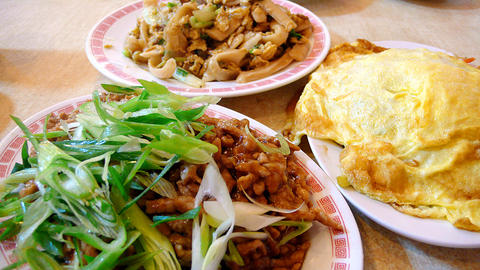In the vicinity of Jhongjhen Rd (中正路), Sindian City (新店市), close to the Huanhe Expressway (環河快速道路), there once stood a cluster of juan cun (眷村), or veteran's villages, where Mainlanders from all parts of China made the neighborhood a hub of the country's various culinary traditions. Cement apartment buildings now stand on the site where this outpost of the Mainlander community once stood, but the culinary legacy of northern Chinese food at bargain prices continues to thrive. One such popular location is the Beiping Huatai Restaurant.
I visited the restaurant with a regular who has been eating there for many years. His opinion was that the restaurant had lost something of its authenticity since the business had been passed down from father to son, but it remains popular and on weekends is certain to be packed with locals. Popular favorites such as Chinese meat pies (餡餅) are always sold out before closing time.
The menu offers hearty northern Chinese dishes such as moo-shu pork and fried knife-cut noodles (木須炒刀削麵, NT$90), pork and vegetable steamed dumplings (蒸餃, NT$75) and scallion pancakes (蔥油餅, NT$25), which are all popular with habitues. Millet congee (小米粥) is another perennial favorite that either accompanies the savory meat pies or can be eaten with sugar.

PHOTO: HO YI, TAIPEI TIMES
Besides the northern staples of dumplings and noodles made from wheat, other dishes such as shredded pork stir-fried in sweet bean sauce (京醬肉絲, NT$145), vegetables covered with an omelet (合菜代瑁, NT$135) and ma-po tofu (麻婆豆腐, NT$120) add diversity to the menu. These should probably be avoided in favor of what the restaurant does best.
Our anticipation of traditional Chinese food, despite the wait in line, was sadly disappointing. Like many old eateries of its kind, the interior is plain and the service is loud and direct, giving the restaurant a homely charm.
Beiping Huatai Restaurant is not a place for sophisticated dining, but if you want local ambiance and food at reasonable prices, this establishment, which produces a hearty meal delivered by a passable kitchen and continues to thrive on a reputation from a bygone era, is certainly a good option.

May 18 to May 24 Pastor Yang Hsu’s (楊煦) congregation was shocked upon seeing the land he chose to build his orphanage. It was surrounded by mountains on three sides, and the only way to access it was to cross a river by foot. The soil was poor due to runoff, and large rocks strewn across the plot prevented much from growing. In addition, there was no running water or electricity. But it was all Yang could afford. He and his Indigenous Atayal wife Lin Feng-ying (林鳳英) had already been caring for 24 orphans in their home, and they were in

On May 2, Chinese Nationalist Party (KMT) Chairman Eric Chu (朱立倫), at a meeting in support of Taipei city councilors at party headquarters, compared President William Lai (賴清德) to Hitler. Chu claimed that unlike any other democracy worldwide in history, no other leader was rooting out opposing parties like Lai and the Democratic Progressive Party (DPP). That his statements are wildly inaccurate was not the point. It was a rallying cry, not a history lesson. This was intentional to provoke the international diplomatic community into a response, which was promptly provided. Both the German and Israeli offices issued statements on Facebook

Even by the standards of Ukraine’s International Legion, which comprises volunteers from over 55 countries, Han has an unusual backstory. Born in Taichung, he grew up in Costa Rica — then one of Taiwan’s diplomatic allies — where a relative worked for the embassy. After attending an American international high school in San Jose, Costa Rica’s capital, Han — who prefers to use only his given name for OPSEC (operations security) reasons — moved to the US in his teens. He attended Penn State University before returning to Taiwan to work in the semiconductor industry in Kaohsiung, where he

President William Lai (賴清德) yesterday delivered an address marking the first anniversary of his presidency. In the speech, Lai affirmed Taiwan’s global role in technology, trade and security. He announced economic and national security initiatives, and emphasized democratic values and cross-party cooperation. The following is the full text of his speech: Yesterday, outside of Beida Elementary School in New Taipei City’s Sanxia District (三峽), there was a major traffic accident that, sadly, claimed several lives and resulted in multiple injuries. The Executive Yuan immediately formed a task force, and last night I personally visited the victims in hospital. Central government agencies and the